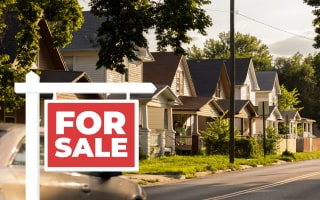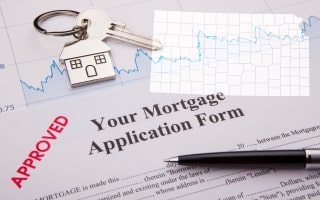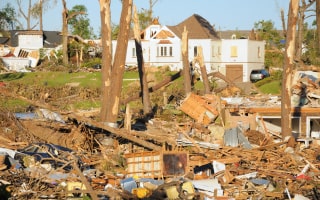Home Buying in Kansas

Three million people reside in Kansas, and the State Department of Commerce says it's also home to 7,000 companies that take advantage of its central location for product distribution.
In general, the state's population growth is slow, under 1 percent per year. The state is also graying, with the largest population increase among people over 65, and almost no increase in those under age 10. Part of the reason for this may be Kansas does not tax Social Security income or public pensions for those making less than $75,000 per year, making it welcoming to seniors.
The average home price in Kansas is $226,870, nearly $200,000 less than the country's average price of $420,000. Kansas' prices have increased by 5 percent in the past year, and this trend is expected to continue as the supply of available homes is far short of the demand. Several factors contribute to the short inventory situation, including too few new homes under construction and longtime homeowners with low-interest rate mortgages who don't want to sell their homes because their next mortgage would have a much higher interest rate.
Buying a Home in Kansas
Kansas ranks right in the middle of the 50 states for things like crime, healthcare, and the economy, according to a national magazine. The state's cost of living is low, and job opportunities are good. The average income in Kansas is $50,000 for a couple, but closer to $35,000 for individuals. Those positive attributes collide with a housing crunch that doesn't make it easy to take advantage of the lifestyle in Kansas.
The median age of a home in Kansas is more than 40 years, and the state is mostly single-family buildings, 78 percent. The U.S. Census says the Wichita and Kansas City metro areas are both well behind in building enough new homes to meet the current demand. While these areas aren't lagging as much as urban areas like Los Angeles or New York, the shortfall is significant.
The result is less pressure on sales, so there are fewer above-asking-price offers and lower stress on buyers, even if the inventory is low. In other parts of the country, people are paying wildly high prices for average homes.
An assessment of Kansas' housing stock revealed nearly a quarter of it is substandard, mostly rural homes. The future focus will be on replacing those properties with units in urban areas. Much of the country is in a similar housing crunch because we have not caught up to the multi-year slump in construction that followed the Great Recession in 2008-2010.
A home in Kansas sells within 50 days during the warm months but closer to 90 days during winter, giving buyers some cushion to make a decision and gather their resources. Buyers with a 10 to 20-percent down payment ready and prequalified for a mortgage will have their choice of properties. To get a mortgage, you need a solid work history and a credit score above 600. (It can be a bit lower if you can make a 20 percent down payment.) Your credit score improves as you pay off loans and make prompt payments on debts. Your credit score is based in almost equal parts on your payment history and your income-to-debt ratio.
Finding the Right Home

Moving to Kansas is usually prompted by a job change or a decision to study there. Fortunately, within the state, there are many options for chill neighborhoods, cultural delights, and culinary discoveries. In Topeka, you may check out the Jayhawk Theatre, Brown v. Board of Education National Historic Site, or the Evel Knievel Museum. Wichita offers an annual 9-day Riverfest event, a Gallery Crawl on the first Friday of each month, and opportunities to hang with exotic wildlife at zoos and preserves. And, of course, Kansas City has a football team, the Chiefs, that's fun to watch.
If taxes are a concern, check additional sales taxes counties may levy, which can add up to more than 8 percent (state sales tax is 6.5 percent). The state's average property tax bill is $1,265, but it's nearly $1,000 higher in Johnson County, southwest of Kansas City. Average commute times around the state are about 20 minutes.
In Kansas's countryside, considerations for buyers are:
-
Upkeep of larger properties
-
Travel time to work and necessities
-
Additional insurance for severe weather events
-
Distance to emergency services
In Kansas cities, considerations include:
-
Additional local taxes
-
Neighborhood vibe
-
Crime
What is the Typical Home Buying Process in Kansas
Narrow your search to a few miles from your job or school and do some forensic research: what kinds of homes are in the area, and how much can you spend? Homes in Kansas appreciate in value more slowly than in the rest of the country, so a strategic approach is necessary. If the housing market stagnates, will you get your money back when you're ready to move on? These considerations can alter your purchasing decisions significantly.
Having a local realtor may enhance your chances of finding the home with the qualities you're seeking. A professional buyer's agent listens to your priorities, understands your budget, and works on your behalf by sifting through listings to find those most closely matching your desired location and amenities. That person will also help you create a strategy for finding and purchasing a home, including writing your offer and negotiating the price.
When taking you to see homes, your realtor should have research ready on the property's price history, the pros and cons of the local area, and state and local taxes. They will help hire an inspector, renegotiate the price if there are structural or systemic issues, and keep the closing process on track.
To use a buyer's agent, you will sign a contract outlining their role and payment. Instead of splitting a 5-6 percent commission with the seller's agent, the buyer's agents now negotiate with the buyer. Their payment can be written into the purchase offer, making the commission part of the sale price.
In general, the process of buying a home is:
-
Saving for a down payment.
-
Prequalifying for a mortgage.
-
Identifying the optimal area and price and ranking alternatives.
-
Viewing enough homes to feel comfortable with a decision.
-
Making an offer.
-
Making a down payment.
-
Having the property inspected.
-
Having the deed researched.
-
Closing the deal, including paying closing costs.
Financing Your Home Purchase

It can take years to amass a down payment for a home. A bigger down payment makes it easier to get a mortgage, so borrowing from a family member may be a good option. A single buyer making $35,000 with 10 percent down on a $215,000 home is unlikely to be approved for a 30-year mortgage because payments would be about $1,400 per month. Lenders won't allow most buyers to take on a mortgage that's more than one-third of their annual income.
The same buyer making $35,000 per year but with a 20 percent down payment is much closer to getting a mortgage because monthly payments are $300 lower. Closing costs are usually an additional $2,500-$4,500, which is also expected in cash.
When shopping for the best mortgage, start with your local bank. A bank that has a history of working with you may extend special benefits to regular customers to get their mortgage business. You may also compare your bank's offerings to those of a mortgage broker who has access to a wide variety of choices and can find a good deal for you. Your decision may hinge on your knowledge of and comfort level with the mortgage industry.
Your income-to-debt ratio and history of on-time payments are critical to qualifying for good mortgage terms. Your credit should be above 600 for government-backed loans and above 640 for other mortgages. Start early by requesting free copies of your credit report from the major agencies (Experian, Equifax, and TransUnion) to correct any errors. Fortunately, new laws now block medical debt from being reported to lenders.
The federal interest rate is above 7 percent, which translates to higher payments for buyers. Some people are waiting for the interest rate to drop, but rental housing is in a squeeze these days.
Fixed-rate mortgages are great if interest rates are low, but less desirable if rates are high (rates rise and fall incrementally over periods of years). Adjustable-rate mortgages are riskier because the interest rate can change during the loan's term. Jumbo mortgages allow wealthy buyers to borrow more than the federal housing authority limit, about $766,000, in areas of particularly high property values.
Mortgage options include these government programs:
- Kansas Housing offers special mortgage programs for first-time buyers and those interested in rural properties. These often allow lower down payments for qualified buyers.
- FHA mortgages are tailored for first-time buyers with down payments of less than 5 percent.
- Rural properties may qualify for USDA loans, especially buyers with low incomes, but good credit scores.
- Military veterans and their surviving spouses may seek a Veterans Administration-underwritten VA loan. These mortgages do not require PMI and may be used multiple times by qualifying individuals.
Home Insurance

Homeowners insurance in Kansas is not required, but your mortgage lender is likely to make it mandatory. The national average cost of homeowner's insurance is $1,800 per year, but in Kansas, it's 86 percent higher, at $3,500 per year, likely due to extreme weather events like tornadoes. Your mortgage lender will require both homeowner's insurance and mortgage insurance, called PMI, to protect their interest in the property. PMI is calculated at .7 percent of the loan amount with some variability for the borrower's credit score, so about $100 a month or $1,260 per year on a $180,000 mortgage. This is in addition to your mortgage payment.
In Kansas, extreme weather prompts many homeowners to purchase additional insurance. Barns, fences, and garages are not covered unless specifically noted in the homeowner's policy for coverage. Valuable personal possessions inside the home are unlikely to be covered by insurance unless an additional rider is written.
Home Buying Challenges
The decision to purchase a home in Kansas is both personal and financial. Owning your home makes you more secure against rent increases, but it can be a challenge to sell if your job or other prospects make you transfer. Since properties are appreciating at a modest pace, a home purchase should be a long-term commitment in order to recuperate your investment. Remember, if you move out of the state and decide to rent your property, your financial obligation to the mortgage holder will change because it will no longer be your primary domicile.
Keeping a property in good condition, including addressing any structural or systemic issues, will ensure a good return on your investment.
Kansas Home Inspections
Kansas experiences extreme weather, such as severe thunderstorms, tornadoes, flooding, snowstorms, and heat waves. As a result, some common problems found during home inspections include roofing issues, water damage, foundation problems, and other structural issues. A Kansas home inspection could save a buyer thousands in costly repairs and help them make a more informed decision. If the inspector finds problems, it could also give the buyer more bargaining power.
A home inspection in Kansas is a thorough physical assessment of the property, checking the home's structural integrity, the major systems, safety features, and appliances. Some of the items on the list will be:
-
Structural Elements: The inspector will review the foundation, walls, floors, ceiling, and stairs for signs of decay or damage.
-
Roof: Inspectors check the condition of the shingles, flashing, gutters, and chimney, examining them for leaks or other signs of wear and tear.
-
Home Exterior: They will also check the home's exterior (siding, windows, doors, etc.), looking for leaks or signs of damage.
-
Heating, Ventilation, and Air Conditioning (HVAC): Inspectors will test the heat, air conditioning, and ventilation systems to ensure they operate correctly and comply with safety codes.
-
Plumbing: The inspection also includes checking pipes, fixtures (tubs, sinks, toilets), and the water heater, as well as looking for any leaks, damage, or other issues.
-
Electrical: Inspectors will also examine wires, outlets, electrical panels, circuit breakers, and light fixtures for safety and compliance.
-
Attic: Attics, too, can have issues that could be costly to fix, like insulation, ventilation, water damage, and rodents.
-
Foundation: An inspector will search the foundation for water damage, leaks, and cracks, indicating more significant problems.
-
Interior: They will also examine the house's interior (walls, ceilings, floors, windows, etc.), looking for signs of damage or structural issues.
-
Tests: Some include tests for mold, radon, termites, asbestos, lead paint, and other contaminants.
-
Appliances: Checks the built-in and stand-alone appliances for functionality.
A home inspection in Kansas costs between $350 and $400. However, prices can vary depending on the home's size, age, condition, and complexity.
The Process
In real estate transactions, the buyer pays for the Kansas home inspection because it benefits them by inspecting the entire house before buying. The process usually looks as follows:
- Find a reputable, local home inspector with whom they want to work.
- Schedule the home inspection at the right time.
- Show up and stay for the entire inspection. Ask questions as necessary. The complete inspection will take between two and three hours.
- Review the final report and decide where to go from there.
The top five home inspection companies in Kansas are:
- KC Property Experts Home Inspections - Overland Park, KS
- Profound Home Inspections - Andover, KS
- Golden Home Inspections - Kansas City, KS
- Legacy Home Inspections - Lenexa, KS
- Metro Property Inspection - Lenexa, KS
After the Inspection
After the inspection, the inspector must put all the findings into a written report for the buyer. They give copies to all interested parties. The buyer then has some options available to them if the report finds things that need fixing. The options are as follows:
- Save money by negotiating a lower price due to the repairs needed.
- Ask the seller to make the repairs before closing.
- Ask for a home warranty.
- Secure a reduced down payment.
- If significant issues are found, the buyer can even walk away from the deal without losing any money.
Inspection Top Cities
| City | Inspection Cost | Local Issues | Local Rules | Local Home Types |
|---|---|---|---|---|
| Home Inspection in Wichita | Starting at $300 and may go up depending on the home's size and inspection services. | Plumbing, drainage, termites, roof, and water damage. | Not mandated, strongly recommended. | Single-family homes, duplexes, and others. |
| Home Inspection in Overland Park | $400-$500 for a standard-sized home. | Roof, electrical, HVAC, plumbing, and foundations. | No local rules. | Single-family, townhouses, condos, and multi-family homes. |
| Home Inspection in Kansas City | $400-$450 depending on the home's size, age, and location. | Roofing, electrical problems, poor ventilation, and not enough insulation. | None. | Ranch, Victorian, Tudor Revival, Modern, and Contemporary. |
| Home Inspection in Olathe | $300-$600 depending on the size and complexity of the home. | Plumbing, electrical, roof, foundation, and HVAC. | Not mandated. | Single-family homes, townhomes, duplexes, triplexes, and land. |
| Home Inspection in Topeka | $350-$400 based on the home's size and services required. | Roof, plumbing, HVAC, mold, electrical, and structural issues. | No local rules. | Single-family homes, townhomes, condos, and manufactured homes. |
Instant Access to Kansas Property Records
- Owner(s)
- Deed Records
- Loans & Liens
- Values
- Taxes
- Building Permits
- Purchase History
- Property Details
- And More!